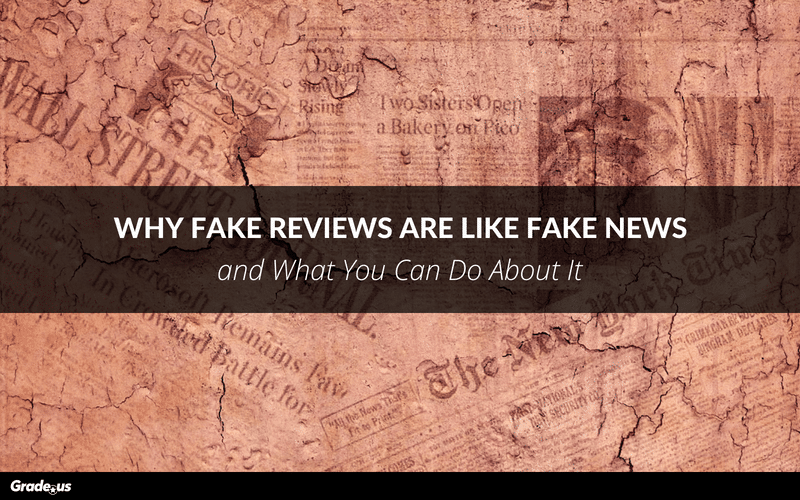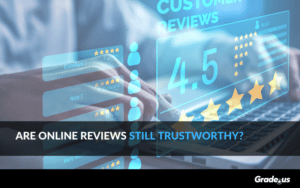Can I trust you?
It's the question your customers want an answer to. It's also why customers turn to online reviews from a trustworthy, unbiased third-party source.
Fake reviews are the problem.
Customers can’t always trust marketers to deliver on their promises. Research shows entrepreneurs, marketers and sales people are viewed as the least trustworthy. It’s the reason why we have online reviews in the first place.
Customers trust customers.
Reviews from customers who can give a first hand, unbiased account of the products and services they’re interested in.
They thought they could trust these reviews.
But fake reviews are damaging review platforms like Yelp, TripAdvisor, Amazon, etc. Most sellers know the value of a five star review. Businesses know reviews are kingmakers after all. They attract customers in droves, boost conversion rates and increase revenue.
Which is why reviews are so appealing to sellers.
Dishonest sellers use fake reviews to steal from you
They're not like you.
They aren't interested in doing the hard work it takes to get a legitimate review. Why go above and beyond for a customer, providing them with an exceptional product or service? They just need to launch a negative review campaign attacking your business, product or service. They create an avalanche of misleading reviews about how terrible you are.
Lying is easier and it's more effective.
At least, that's the rationale. These dishonest sellers feel it's easier to take the easy way out. They post a yucky ad on CraigsList requesting an online review, in exchange for a few dollars.
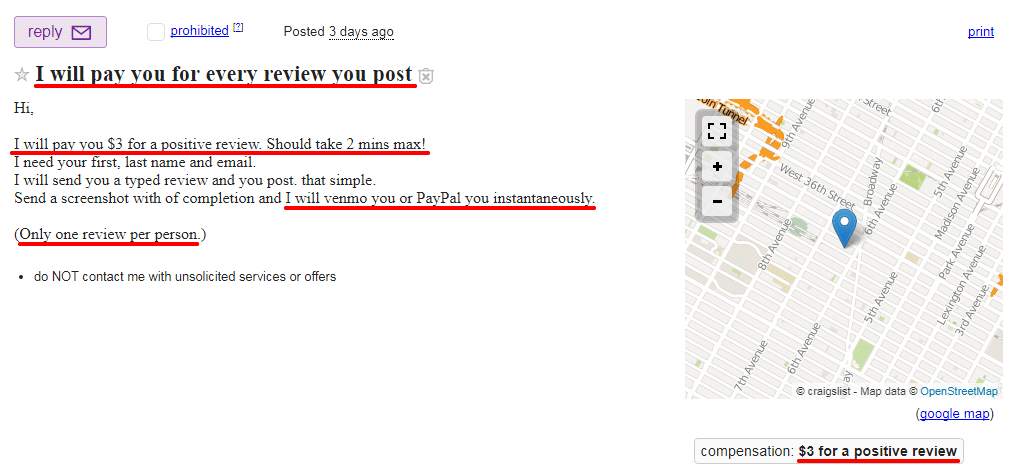
Sometimes they're a bit more involved offering a little more money.
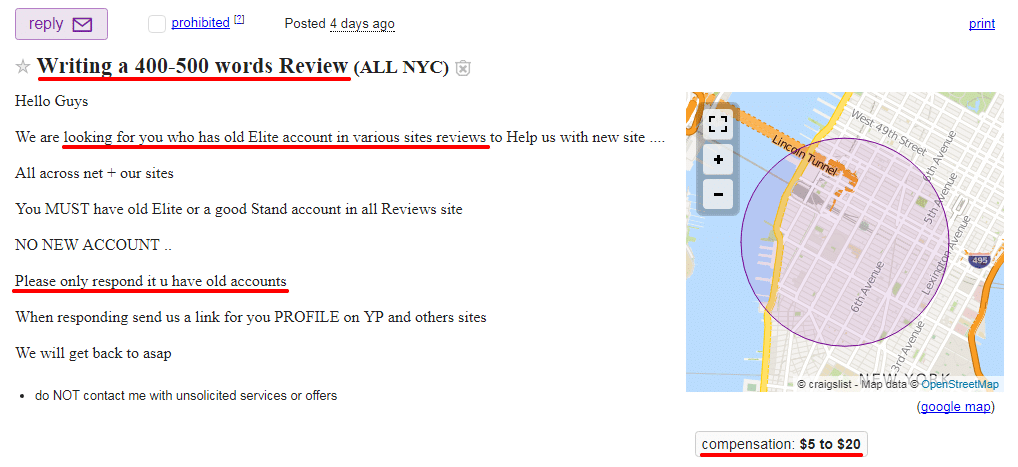
Then there’s ingroups and outgroups. Some sellers are attacked by reviewers who aren’t part of their “tribe.” These reviews are looking to hurt these sellers.
Take a look.
Ayesha Curry’s restaurant is coming to Houston, and #Rockets fans have already piled up the 1-Star reviews before it even opened 😂😂😂 #Warriors #NBA pic.twitter.com/3BqL84zlJy
— Tomer Azarly (@TomerAzarly) June 19, 2018
Ayesha Curry, wife of Golden State Warriors point guard Stephen Curry, decided to open a new BBQ restaurant. In Houston.
The problem?
The Golden State Warriors defeated the Houston Rockets, in the NBA semi-finals.
How did fans respond?
They flooded Curry’s restaurant with fake one star reviews before it’s even opened.
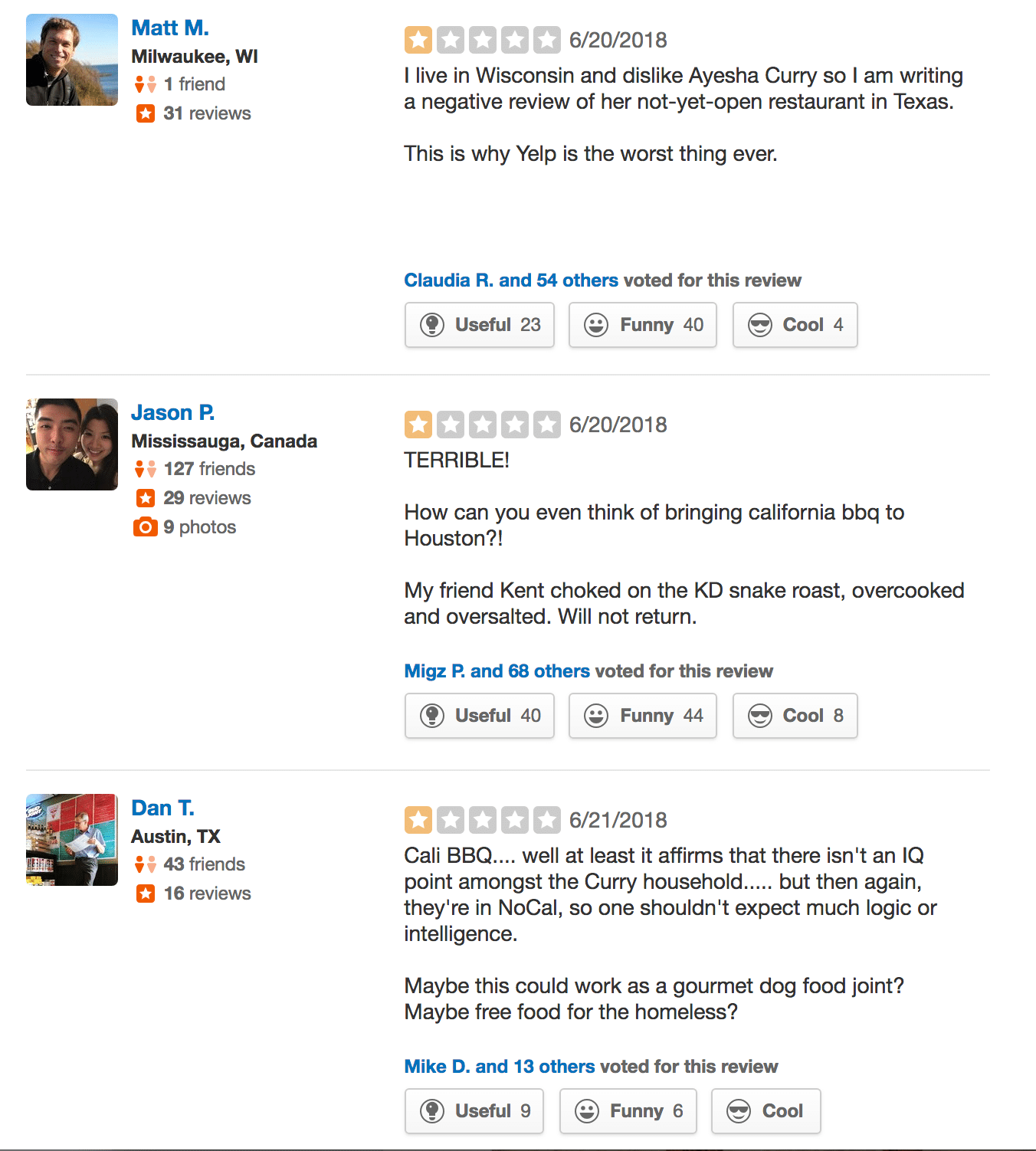
Yikes.
Aaaand then there’s Sarah Huckabee Sanders. She’s the press secretary for the Trump administration. She ate out with friends and the Red Hen restaurant in Virginia. After speaking with her staff, Stephanie Wilkinson, co-owner of the Virginia restaurant asked Sanders to leave.
The backlash was swift and severe.
:format(webp)/cdn.vox-cdn.com/uploads/chorus_asset/file/11593965/Red_Hen_DC_fbwn.png)
Negative reviews poured in via Facebook and Yelp. Reviewers shared their hostile feedback in an effort to destroy the Red Hen. Some explicitly stated why.
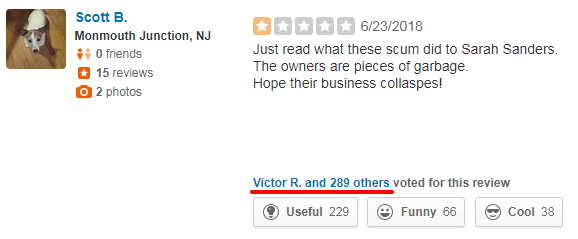
Regardless of where you fall on the political spectrum, one thing is clear. Most of these one star reviews are fake.
They’re lies.
It’s incredibly frustrating and very discouraging when you’re on the receiving end of these fake reviews. It’s easy to understand why business owners feel helpless and lost when they’re attacked by dishonest competitors and angry reviewers who are looking to game the system.
But the results are typically the same. A dishonest seller is caught, eventually. The outcome is largely negative and the seller's reputation with customers is ruined. Fake reviews are removed or buried.
Are they really though?
Are seller reputations really ruined by this kind of dishonest or bad behavior?
Absolutely.
How do we know? Operation Clean Turf. New York's Attorney General fined 19 businesses over $350,000 for generating fake reviews.
Who were the guilty parties?
Agencies. PR firms, search engine optimization companies, web design and marketing firms. The list also included individual businesses who defrauded customers on their own.
These agencies lied to customers for more than a year.
It took some time, but eventually these businesses were caught. Each of these businesses entered into “Assurances of Discontinuance,” forcing them to discontinue their reputation management services.
Most of these companies didn't survive.
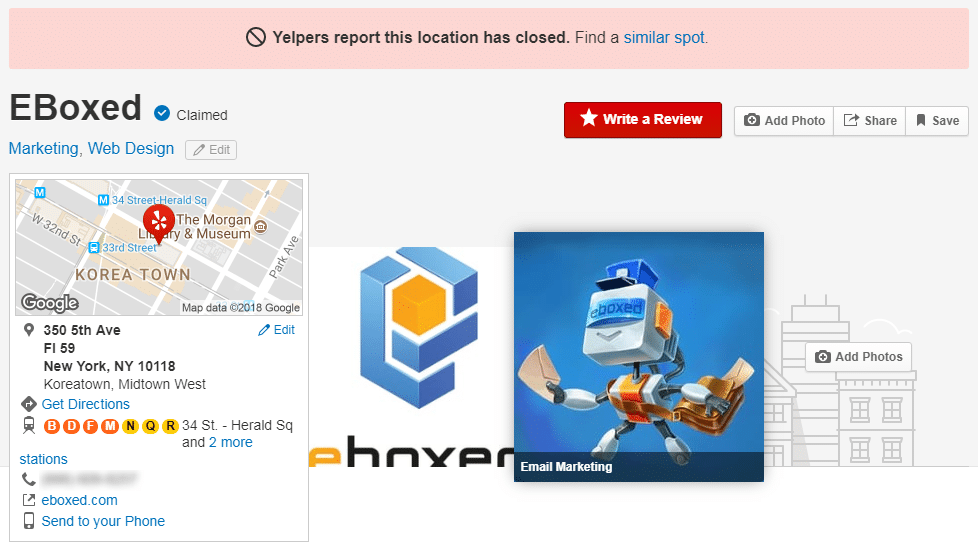
That’s the problem with fake reviews. They’re not valuable as one-offs. If agencies are looking to lie to their client’s customers, they’ll need a large amount of fake reviews.
Which only makes things worse.
The more fake reviews you have in your review portfolio, the greater your odds of getting caught. The value dishonest sellers receive from fake reviews is self-defeating. It becomes the proverbial noose around their organization’s neck. Eventually they’ll be caught.
Here's the bigger problem with these fake reviews.
They affect everyone.
Fake reviews, like fake news, decrease collective customer trust over time. As competition increases, the demand for results grows. These demands incentivize dishonest and sketchy reviews.
Google, Amazon and Facebook are struggling to keep up.
Google Maps is flooded with fake reviews and non-existent listings from fraudulent sellers claiming homeowner addresses. Amazon sued 1,114 fake reviewers on Fiverr.com, relying on lawsuits and the court system in hopes of reducing the deluge of fake reviews from third party sellers.
They’re catching up but it’s slow going.
As a result, these “growth-hacking” scams have resulted in consumers scheduling appointments with non-existent companies. Customers have unknowingly purchased products and services from dishonest sellers who haven’t earned their business.
All this means customers are less likely to trust brands.
Got Fake Reviews?
Protect your business from a competitor's fake negative review campaign attack. When you have a positive review portfolio, your business is better equipped to fend off fake reviews. Get authentic positive reviews from your happy customers.
Speak to a Product ExpertWill customers trust an authentic review?
Sure...
If they can tell the difference between genuine and fake reviews. Which is exactly the problem with fake reviews. It's getting harder and harder to tell them apart.
Customers aren't sure.
Which leaves you with only one option. You'll need to be more trustworthy than you already are.
It isn't fair, I know.
You're probably already doing the right things. You're treating your customers well, you under promise and over deliver. You give customers your very best. Now you're expected to do more, because dishonest sellers are too crooked to do things right?
Pretty much.
The dishonesty of competitors around you corrupts your environment. Their bad behavior, like fake news, seeds the marketplace with distrust. Day by day, customers, employees and suppliers in the industry learn to trust a little less.
You're the vaccine.
The antidote to the scheming, dishonesty and distrust in your environment. It sounds nice but what does that mean exactly? Create the right ingredients for trust to flourish and your company can withstand the second-hand fallout that comes from dishonesty.
Be the example.
Can you create authentic reviews?
Sounds simple, doesn't it?
It is, but simple doesn't mean it's easy. Authentic reviews require several internal and external ingredients to be effective. These ingredients act as incubators ensuring that (a.) you attract the right kind of reviews (honest ones) and (b.) that you're building the kind of audience that can (and will) defend your good name when asked.
Internal requirements
1. No carrot/stick incentives. No performance quotas or requirements. Nothing that threatens an employee's safety, security or acceptance within an organization.
2. Fostering genuine care for customers. Zappos doesn't force their employees to use complicated phone scripts. They're not in a rush to get customers off the phone. They take their time. They do what it takes to give customers the genuine care, guidance and protection they need.
3. A-player, results driven mentality. The people you hire, directly impacts the reviews you'll receive. Fill your company with A-player teammates who produce results and you attract a disproportionate amount of reviews from happy, satisfied and loyal customers.
4. Protection from abusers. The customer is not always right. Some customers are abusive and unkind, treating your employees as if they're the help. A work culture that's driven by a fear (of losing customers) means employees are more likely to be punished and sacrificed if customers are unhappy.
External requirements
1. Psychological safety. This is defined as the shared belief that it's safe to take interpersonal risks. Customers need to know they can give you bad news openly and honestly without fear of backlash or retaliation. Safety begets transparency and openness.
2. Genuine communication. When customers share an unpleasant experience they're looking for a genuine response from a real human being. They're turned off by unnecessary jargon. Insincere attempts to "take the conversation offline" create anger.
3. A clear plan to follow. Savvy organizations know when to respond to customer reviews and how. They know the one-star reviews they should avoid and the five-star reviews that need immediate attention. They're prepared for a publicity crisis and they have the ability to counteract negative sentiment.
4. Coaching customer reviews. This sounds gross, doesn't it? As if you're coaching customers, telling them what to say or writing their reviews for them. That's not what this means. Often times, customers love your product or service, but they don't know what to say. Coaching customers means you orient their thinking by asking the right questions. You ask about their fears coming in, their objections, their deal breakers, etc. Then you sit back and let them do all of the talking.
These internal and external requirements are your incubators. They inoculate your business against fake reviews. When competitors use fake reviews, your organization remains unaffected. If competitors throw fake reviews at your product or service, your audience enables you to fight back.
You won't be able to tell authentic and fake reviews apart
Cornell researchers found people weren't able to tell authentic and fake reviews apart. That's an important detail to identify. When it comes to deception, some sellers are exceptional.
The researchers are right.
Customers will catch some fake reviews. They won't be able to catch enough of them to make a significant difference. Alarmists tell us this could mean the end of reviews.
These fears are overblown.
As history has shown, customers will adapt in time. Remember when the internet was in its infancy? Customers consistently fell for phishing emails, Nigerian scams and spoof websites. Customers these days are on their guard. They're quick to verify claims with Snopes, Politifact and the like.
It's the same with reviews.
As online reviews continue to grow and evolve, so will customers. Customers learn to differentiate between the authentic and fake review. It's a natural and inevitable part of the review management process. It's also not where your focus should be.
Be like the New York Times.
They shined a light on the fake news problem. They taught readers about fake news - what it was, how it works, why it spreads. They made it easier to identify the truth. They worked hard to cultivate trust and transparency.
With the advent of fake news they worked harder.
When opponents shared the (fake) story that they were failing, they worked harder. They responded with transparency, sharing insider data that showed the real story.
You can do it too.
You can beat dishonest sellers at their own game
With the right requirements you can insulate your business against fake reviews. With authentic reviews, you can attract more of the right customers.
Fake reviews are like fake news.
They hurt everyone. Dishonest sellers corrupt your environment. They seed the marketplace with distrust. They decrease customer trust over time.
You're the vaccine.
Seed the marketplace with authentic reviews to inoculate your organization against dishonest sellers. Avoid fake reviews and you'll earn what your organization needs most.
Your customer's trust.
About the Author
Andrew McDermott
Andrew McDermott is the co-founder of HooktoWin. He shows entrepreneurs how to attract and win new customers.

